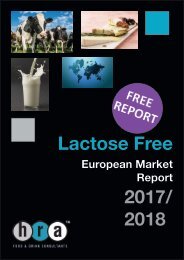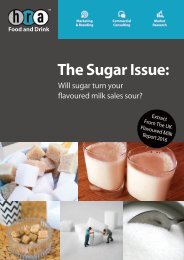Flavoured_Milk_Free
The backdrop to the UK flavoured milk market is one of relentless change. The removal of the EU milk quotas, the transition by emerging economies to a Western-style diet, the upcoming introduction of the ‘sugar tax’ and the booming sports nutrition industry are all aspects of change that create both challenges and opportunities for the UK flavoured milk market. HRA Food and Drink has developed this report as a map to guide industry stakeholders. Although volume growth in 2014 was slightly lower than in previous years, the flavoured milk market still has plenty of room for product innovation in the future.
The backdrop to the UK flavoured milk market is one of relentless change. The removal of the EU milk quotas, the transition by emerging economies to a Western-style diet, the upcoming introduction of the ‘sugar tax’ and the booming sports nutrition industry are all aspects of change that create both challenges and opportunities for the UK flavoured milk market.
HRA Food and Drink has developed this report as a map to guide industry stakeholders. Although volume growth in 2014 was slightly lower than in previous years, the flavoured milk market still has plenty of room for product innovation in the future.
You also want an ePaper? Increase the reach of your titles
YUMPU automatically turns print PDFs into web optimized ePapers that Google loves.
UK FLAVOURED MILK MARKET 2017 & BEYOND<br />
Political factors<br />
• Removal of EU milk quotas is in part responsible for low dairy prices, which have<br />
fell 30% between 2013 and 2015 (BBC July 2016), as global milk production overtook<br />
demand. This has a significant impact on the flavoured milk market as flavoured<br />
milk becomes an attractive opportunity to add value back onto dairy products.<br />
• The abolition of the Chinese one child policy is likely to have an impact on the<br />
global flavoured milk market. An impending rise in infant population in China could<br />
represent a significant opportunity for the flavoured milk market.<br />
• Other domestic political factors that could affect the flavoured milk market are the<br />
UK’s exit from the European Union, and the implementation of a ‘sugar tax’ on<br />
high-sugar drinks (excluding milk-based drinks) in 2018.<br />
Technological factors<br />
• Alternative sweeteners, such as stevia and coconut palm sugar, signify an<br />
important development for the flavoured milk market.<br />
• Bottling facilities available in the UK has a substantial impact on the market.<br />
Currently there is a lack of contract manufacturers able to produce flavoured milk<br />
in UHT plastic bottles, with the majority of UHT products being produced in<br />
continental Europe.<br />
Social factors<br />
• Growing support for British farmers has already impacted consumer purchase<br />
patterns within the white milk market, with Morrisons ‘<strong>Milk</strong> for Farmers’ brand<br />
performing well.<br />
• An ageing population in the UK is an important factor to be considered by food and<br />
drink brands, as consumer needs and preferences change.<br />
• Increasingly hectic lifestyles and a growing interest in plant-based diets are<br />
both factors which have already impacted the food and drink market, with on-thego<br />
propositions and dairy alternatives both seeing good growth.<br />
Environmental considerations<br />
• A tax on carbon emissions associated with animal derived products is another<br />
factor likely to have an impact on the flavoured milk market.<br />
• Growing awareness of environmental impacts of cattle production, through films<br />
like ‘Cowspiracy’, may increase sales of plant-based milk alternative<br />
137<br />
© 2016 Teepee Limited. All Rights Reserved.







